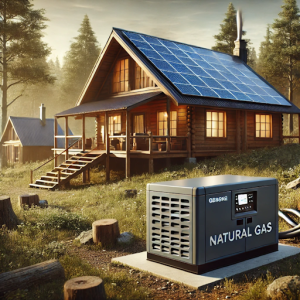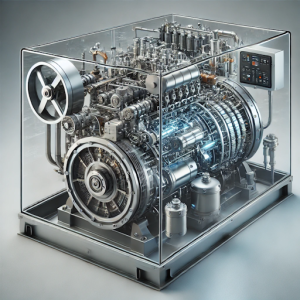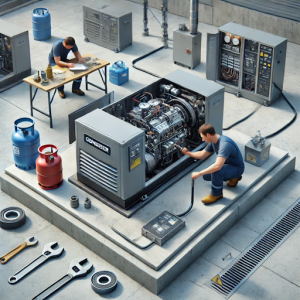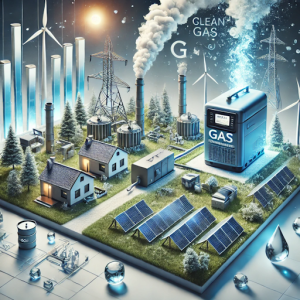Discover the Incredible Advantages of Natural Gas Generators for Sustainable Off-Grid Living
Natural gas generators emerge as an exceptional choice for those seeking a dependable power source for homes or cabins situated in remote locations. It's essential to comprehend the various methods of power generation to embark on a successful off-grid adventure. The unique benefits of natural gas generators—including their reliability, cost efficiency, and environmentally friendly characteristics—make them a compelling option for off-grid enthusiasts who value sustainability and energy efficiency. By prioritizing these features, individuals can ensure they make informed decisions that align with their off-grid goals.
In our rapidly evolving, technology-driven world, the allure of off-grid living has piqued the interest of many individuals. Whether driven by a desire for sustainability, autonomy, or the pursuit of a self-sufficient lifestyle, disconnecting from conventional power grids can be remarkably rewarding. Off-grid energy solutions empower you to harness energy from renewable resources or alternative fuels, allowing for a comfortable living experience that is independent of traditional electricity sources and fostering a sense of freedom and adventure.
By arming yourself with the necessary knowledge and preparation, you can seamlessly incorporate a natural gas generator into your off-grid living strategy, ensuring that your critical needs are consistently met with a reliable and steady power supply. This article will delve into the myriad advantages of natural gas generators, clarify their operational mechanics, and highlight crucial considerations to keep in mind when selecting and installing them for your off-grid lifestyle.
 Essential Insights for Enhancing Your Off-Grid Power Solutions
Essential Insights for Enhancing Your Off-Grid Power Solutions
- Off-grid power solutions empower you to liberate yourself from traditional energy sources, establishing them as vital for remote living or during unforeseen power outages.
- Natural gas generators offer reliable and efficient energy production with considerably lower emissions compared to diesel or gasoline alternatives, making them a cleaner choice.
- These generators function by combusting natural gas to create mechanical energy, which is subsequently converted into electrical energy through a generator system.
- When selecting a natural gas generator, it’s essential to assess factors like power output, fuel efficiency, and maintenance requirements to ensure optimal functionality.
- Proper installation and routine maintenance are crucial for the safe and efficient operation of your natural gas generator, ensuring long-term performance.
Uncover the Remarkable Benefits of Natural Gas Generators for Reliable Power Generation
A standout feature of natural gas generators is their remarkable reliability. By opting for a natural gas generator to meet your off-grid energy demands, you can depend on a continuous power supply tailored specifically to your consumption needs. Unlike solar panels or wind turbines, which can be adversely impacted by weather conditions, natural gas generators provide stable energy output that remains unaffected by external factors, ensuring your energy demands are met consistently.
This level of reliability is particularly vital for individuals who rely on electricity for essential functions such as heating, refrigeration, and the operation of medical equipment. Knowing that your generator will deliver power precisely when you need it brings a profound sense of peace and security. Additionally, natural gas generators can also offer significant cost savings over time, making them an appealing choice for budget-conscious consumers.
While the initial purchase price may be higher than some alternative off-grid solutions, the long-term savings can be quite substantial. Natural gas is often less expensive than gasoline or diesel, leading to lower operational expenses in the long run. Furthermore, the maintenance needs of natural gas generators are typically less demanding compared to other fuel types, allowing you to conserve both time and resources while enjoying a reliable energy source.
 Understanding the Operational Mechanics of Natural Gas Generators
Understanding the Operational Mechanics of Natural Gas Generators
Natural gas generators operate by transforming the chemical energy stored in natural gas into electrical energy through a combustion process. When the generator is activated, natural gas mixes with air and ignites within the engine's combustion chamber. This ignition generates high-pressure gases that propel the engine's pistons, effectively turning the rotor of the generator and creating electricity.
This operational process is notable for its efficiency and cleanliness compared to other fossil fuel options. A key component of a natural gas generator is its fuel system, which generally includes a regulator that manages the gas flow to ensure optimal performance. Modern natural gas generators often come equipped with advanced features such as automatic start/stop functions and remote monitoring capabilities, greatly enhancing user convenience and allowing for better management of your power supply.
These innovations simplify the off-grid lifestyle, making it easier to adapt to changing energy needs while ensuring that you have reliable access to power when you need it most.
Key Considerations for Selecting the Right Natural Gas Generator
| Consideration | Description |
|---|---|
| Power Output | Assess the generator's necessary power output based on the appliances and equipment you intend to operate. |
| Fuel Type | Opt for natural gas as your fuel choice due to its clean-burning properties and cost-effectiveness. |
| Size and Portability | Choose a generator size and level of portability that align with your available space and mobility requirements. |
| Noise Level | Evaluate the generator's noise output to ensure it meets the acceptable standards for your living environment. |
| Start-up Mechanism | Choose between manual or automatic start-up options based on your convenience and frequency of use. |
When choosing a natural gas generator for your off-grid setup, there are several critical factors to consider. First and foremost, evaluate your power needs. Calculate the total wattage required to support your essential appliances and devices, ensuring that your selected generator can handle the load efficiently.
It is advisable to choose a generator with a slightly higher capacity than your calculated requirements to accommodate any sudden spikes in power demand. Another vital consideration is the generator's portability and installation needs. If you plan to move your generator frequently or use it in various locations, seek a lightweight and easily transportable model.
Moreover, contemplate whether you prefer a stationary installation or a portable unit that can be conveniently set up according to your requirements. Finally, consider the generator's noise level; opting for quieter models can significantly enhance your off-grid experience by minimizing disturbances and preserving the tranquility of your natural surroundings.
 Best Practices for Effective Installation and Maintenance of Natural Gas Generators
Best Practices for Effective Installation and Maintenance of Natural Gas Generators
Installing a natural gas generator requires meticulous planning and execution to guarantee both safety and operational efficiency. Begin by selecting a suitable location for your generator that adheres to local regulations and safety standards. Ideally, this site should be well-ventilated and sufficiently distanced from any flammable materials.
You may also need to construct a concrete pad or platform to stabilize and protect the generator from moisture damage. Once you have determined the optimal location, connect the generator to your natural gas supply line. If you lack experience with gas line installations, it is advisable to seek professional help to ensure compliance with all safety regulations.
After establishing the fuel connection, set up the necessary electrical connections to integrate the generator with your home’s electrical system. Routine maintenance is crucial for ensuring your generator operates smoothly and efficiently. This includes regular checks of oil levels, air filter replacements, and spark plug inspections to maintain optimal performance.
Comparative Cost Analysis: Natural Gas Generators Versus Alternative Off-Grid Power Solutions
When assessing the costs associated with off-grid energy solutions, it's vital to conduct a comprehensive comparison between natural gas generators and alternative options like solar panels and diesel generators. Although solar energy systems have garnered attention for their renewable qualities, they often necessitate a significant initial investment in panels, batteries, and inverters. Moreover, solar systems may struggle to provide adequate power during cloudy days or at night without sufficient battery storage.
In contrast, diesel generators are renowned for their reliability, but they often incur higher fuel costs and more frequent maintenance requirements than natural gas generators. Given that diesel fuel prices can fluctuate considerably, natural gas generally presents a more consistent and often lower-cost option across many regions. A long-term cost analysis indicates that natural gas generators typically offer a more economical solution for individuals pursuing off-grid living.
 Assessing the Environmental Impact of Natural Gas Generators in Off-Grid Living
Assessing the Environmental Impact of Natural Gas Generators in Off-Grid Living
As you evaluate your off-grid energy alternatives, it is crucial to consider their environmental impact. Natural gas is often regarded as a cleaner alternative to other fossil fuels, such as coal or oil, owing to its lower carbon emissions during combustion. By choosing a natural gas generator, you can significantly reduce your carbon footprint while enjoying reliable power for your off-grid lifestyle.
However, it is important to recognize that natural gas remains a fossil fuel, and its extraction can result in environmental consequences. Methane leaks during extraction and transportation pose significant challenges concerning greenhouse gas emissions. To address these issues, prioritize purchasing natural gas from reputable suppliers committed to sustainable practices.
Furthermore, incorporating renewable energy sources alongside your natural gas generator can further exemplify your commitment to environmental sustainability and responsible energy consumption, creating a more balanced energy solution for your off-grid lifestyle.
Inspiring Real-Life Success Stories of Off-Grid Power Solutions Using Natural Gas Generators
Examining real-world examples provides valuable insights into how natural gas generators have been effectively utilized in off-grid living scenarios. For instance, numerous rural homeowners have transitioned to natural gas generators as their primary energy source after facing frequent outages from traditional utility services. The adoption of these generators has empowered them to achieve energy independence while ensuring a steady supply of electricity for heating, cooling, and essential appliances.
Another noteworthy case study involves remote cabins that depend on natural gas generators for seasonal use. Due to their secluded locations, these cabins often lack access to conventional power sources. Natural gas generators enable cabin owners to enjoy modern comforts such as refrigeration and lighting without compromising their connection to the natural environment.
These success stories illustrate how natural gas generators can effectively support off-grid living, providing comfort and reliability. As you embark on your off-grid living journey, consider the extensive benefits that natural gas generators offer. From their dependability and cost efficiency to their relatively low environmental impact, these generators can play a crucial role in achieving energy independence.
By thoughtfully selecting the right model for your needs and adhering to proper installation and maintenance practices, you can smoothly transition into an off-grid lifestyle powered by natural gas.
Answering Common Inquiries About Natural Gas Generators
What characterizes a natural gas generator for off-grid applications?
A natural gas generator for off-grid living is a power generation system that utilizes natural gas as a fuel source to produce electricity in remote locations where access to the main power grid is limited or unavailable, making it a practical solution for energy needs.
How does a natural gas generator function for off-grid purposes?
A natural gas generator designed for off-grid applications operates by combusting natural gas within an internal combustion engine. This combustion process generates mechanical energy, which is then converted into electrical energy via a generator. The electricity produced can power a variety of appliances, equipment, and lighting in off-grid settings, ensuring a comfortable living experience.
What are the primary advantages of using a natural gas generator in off-grid living?
Key benefits of utilizing a natural gas generator for off-grid living include:
– Lower fuel costs compared to diesel or gasoline generators
– Cleaner combustion leading to reduced emissions
– Continuous fuel supply sourced from natural gas pipelines
– Lower maintenance requirements compared to other fuel types, ensuring long-term reliability
What factors should be assessed when utilizing a natural gas generator for off-grid living?
Important factors to consider when using a natural gas generator in off-grid scenarios include:
– Availability of natural gas supply in your area
– Initial installation and equipment costs
– Regular maintenance and servicing requirements
– Environmental implications and compliance with emissions regulations to ensure sustainability
Is using a natural gas generator off-grid feasible for residential and commercial applications?
Natural gas generators designed for off-grid use are suitable for both residential and commercial applications. They are commonly employed in remote homes, cabins, farms, and small businesses that lack connectivity to the main power grid, providing a reliable energy solution.
The post Natural Gas Generators for Off-Grid Power Solutions appeared first on Survival Bite.
The Article Natural Gas Generators: Your Off-Grid Power Solution Was Found On https://limitsofstrategy.com


It’s interesting how natural gas generators are becoming more popular for off-grid living. I’ve been exploring ways to reduce my carbon footprint, and using a natural gas generator seems like a solid option. They seem much cleaner compared to traditional fuel sources, which is a big plus for environmentally conscious living.
I appreciate the insights you’ve shared about natural gas generators and their role in supporting sustainable off-grid living. It’s fascinating how these generators balance reliability with cost efficiency while also being a greener option compared to traditional fossil fuels. Personally, the thought of living off-grid appeals to me not just for the independence it offers, but for the opportunity to rethink our energy consumption and its impact on the planet.
It’s great to hear that the idea of living off-grid resonates with you. It’s not just about gaining independence, but also about embracing a lifestyle that redefines our relationship with energy and nature. The intersection of technology and sustainability, especially with tools like natural gas generators, opens up so many possibilities.
I’m glad to hear that you find the idea of off-grid living appealing! If you’re interested in exploring more about sustainable energy solutions and how to make the most of your off-grid experience, check out this helpful resource.
https://cnisclub.org/octopus